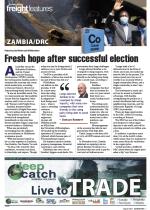A landslide victory for Hakainde Hichilema and his United Party for National Development (UPND) could be the turning point Zambia needs to stimulate the economy and create much-needed jobs, according to Duncan Bonnett, director at Johannesburg-based Africa House.“It was an incredible result. Not too many people saw the landslide victory that has happened. Most analysts said it was too close to call,” Bonnett told Freight News.Zambian business leaders interviewed by Freight News were also very upbeat about the result. They pointed out that the kwacha had strengthened immediately on the news that former president Edgar Lungu had conceded defeat to Hichilema. What was particularly encouraging was the emphasis on reconciliation in Hichilema’s acceptance speech. “With the election behind us, let us come together as Zambians. One Zambia. One Nation,” he said.“To those who voted for other candidates, we extend our hand, in friendship and respect. Though today you may be disappointed, I embrace you as your brother and as your servant.“I will be a president of all Zambians, of those that voted for me and of those that did not.”If Hichilema can deliver on this promise, it will be a move away from the ruling party favouring its supporters – both foreign and local – when it came to awarding contracts. Known as “HH” by his supporters, 59-year-old Hichilema holds an MBA from the University of Birmingham. He headed up the Zambian operations of Coopers and Lybrand, which became part of PricewaterhouseCoopers.His business interests include property management, financial consultancy, and tourism.Hichilema also owns one of Zambia's biggest cattle herds. His government faces huge challenges.Lungu allowed Zambia to be swamped by cheap imports, with many new companies that were friendly to the ruling party being able to avoid taxes, according to Bonnett.Zambian companies that had been in business for over 100 years closed their doors as a result, leading to job losses. The ruling party underestimated the dissatisfaction. The under-35s, who are largely unemployed, turned out in their numbers, says Bonnett.Mismanagement of the economy has left the new government with huge debt.Under Lungu it rose from 36% to 110% of GDP between 2015 and 2021. In November 2020, Zambia defaulted on repaying $42.5m (about R628m) in interest on a Eurobond that was used to pay for road and rail infrastructure.“Lungu built a lot of infrastructure in the form of clinics and roads, but racked up massive debt in the process. You cannot spend your way out of trouble in an economy which is largely commodity driven, and a single commodity at that,” says Bonnett. The investment in roads and rail can be turned to Zambia’s advantage, with Zambia strengthening its position as a central distribution hub serving neighbouring countries, and the Democratic Republic of Congo (DRC) in particular.There are huge opportunities in the DRC, which is booming, according to Bonnett.The DRC has one of the richest and cheapest-to-mine copper deposits in the world, and will be exporting around two million tons a year.In addition, it produces more than 70% of the world’s cobalt, which means that it is insulated to some extent from the vacillations in the copper price.“Cobalt provides a buffer for DRC mines when the copper price takes a dip,” says Bonnett.Lungu allowed Zambia to be swamped by cheap imports, with many new companies that were friendly to the ruling party being able to avoid taxes.– Duncan Bonnett.

